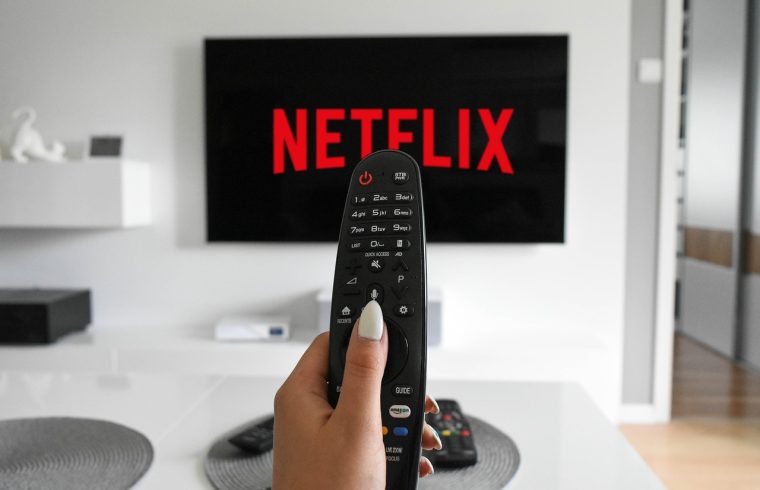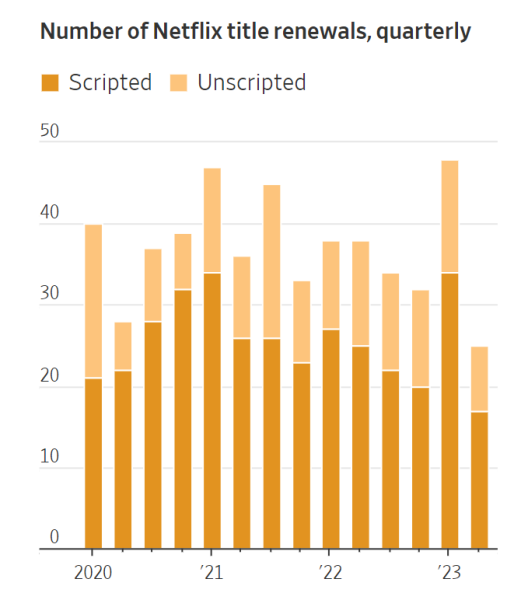
Netflix has been heavily relying on its proprietary technology in gathering and analyzing user data, which drives its growth and allows the streaming giant to remain on top of the industry.
This data plays a crucial role in informing decisions about which shows and movies to produce, renew, and recommend to viewers through the company’s famous recommendation algorithms, according to a recent report from the Wall Street Journal.
Whether it’s new and original content like “The Queen’s Gambit” and “Squid Game,” or part of an existing franchise like “Queen Charlotte: A Bridgerton Story” or subsequent seasons of hits like “Stranger Things,” Netflix relies on user data to drive its success.
Netflix currently shares some of this data privately with content creators and also releases public weekly top-10 lists.

However, depending on the outcome of ongoing strikes by Hollywood writers and actors, the company may be required to share even more of this data.
User data has become a valuable bargaining chip in labor negotiations, as actors and writers argue for fair compensation based on the data that determines the success and profitability of their shows.
In an interview with the SWJ, Michael Wayne, an assistant professor of media and creative industries at Erasmus University, highlighted the significance of data possession in these negotiations.
He pointed to Netflix’s first big original series, “House of Cards,” which still holds value for the company despite being a decade old.
“As long as people who are making content for Netflix don’t know the value of their labor, Netflix has an advantage at the negotiating table,” says Wayne. “Data is central to this.”
Netflix Has Yet to Fully Disclose its Proprietary Internal Data
While Netflix has started sharing more data with producers in recent years, the company has no incentive to fully disclose its proprietary internal data.
Marshini Chetty, an associate professor of computer science at the University of Chicago, told the WSJ that beyond these limited disclosures, Netflix maintains a lack of transparency regarding its data collection practices.
This offers the company a significant advantage in the streaming industry, allowing it to retain subscribers through original content without incurring excessive costs.
Netflix’s ability to utilize data has positioned it as a leading player in the streaming industry. The company added 5.9 million subscribers in the latest quarter, and its profits have continued to rise.
Netflix credited its crackdown on password sharing as a contributing factor to its success.
Furthermore, it boasts holding the top original streaming series position in the US for all but one of the first 25 weeks of 2023.
In contrast, competitors like Disney have been experiencing financial losses in their streaming ventures.
California Law Reveals How Netflix Can Use Data Gathering to Its Advantage
A California law, dubbed the California Consumer Privacy Act, sheds light on Netflix’s data gathering practices and reveals how the company can leverage this data to its advantage.
The law, which came into effect in 2020, requires companies to provide customers with their collected data upon request.
Researchers have discovered that Netflix’s data includes detailed accounts of every piece of content a user has engaged with since creating their account.
This information encompasses viewing duration, location, and device usage.
Additionally, Netflix has unprecedented insight into users’ preferences, enabled by detailed records of their navigation patterns and interactions within the service’s menus.
Netflix has acknowledged that this data powers its recommendation algorithm and influences the testing of different versions of previews, thumbnails, and other content.
All in all, Netflix’s reliance on user data has proven instrumental in its dominance within the streaming industry.
By gathering and analyzing data, the company can make strategic decisions about its content offerings while retaining subscribers and maximizing profits.
Netflix’s Password-Sharing Crackdown Starts to Pay Off
Netflix has started a crackdown on password sharing as the company explores new ways to add more customers.
In its Q1 2023 shareholder letter, the world’s largest streaming service confirmed that it will start a “broad roll out” of its Netflix password-sharing crackdown plan in the second quarter of the year.
As part of the plan, any ‘Netflix freeloaders,’ individuals who use a friend or family member’s Netflix account for free and, most importantly, live in another household, won’t be able to access that account.
The announcement came a few months after Netflix trialed its password-sharing crackdown plan in Canada, New Zealand, Spain, and Portugal.
In its latest letter to shareholders, Netflix acknowledged that, just like during its trial in Latin America in 2022, there was initially a loss of subscribers in these four countries after the implementation of the company’s password-sharing crackdown.
However, the company saw an increase in new paid subscribers, as well as a rise in “extra members” subscription packages.
Netflix's password sharing crackdown worked.
The streamer added nearly 6 million subscribers after implementing its new password sharing policy. pic.twitter.com/jnDpp6qR3Q
— Derek Strickland (@DeekeTweak) July 25, 2023
Furthermore, Netflix has been among the early streaming companies to introduce cheaper, ad-supported tiers to attract customers and offset losses.
Back in May, the company disclosed that its ad-supported streaming tier, launched last November, has reached nearly five million monthly active users.
Neftflix’s basic ad-supported plan is currently priced at $7 per month and represents a reduced-cost alternative to Netflix’s standard offerings that start at $10 per month.
What's the Best Crypto to Buy Now?
- B2C Listed the Top Rated Cryptocurrencies for 2023
- Get Early Access to Presales & Private Sales
- KYC Verified & Audited, Public Teams
- Most Voted for Tokens on CoinSniper
- Upcoming Listings on Exchanges, NFT Drops